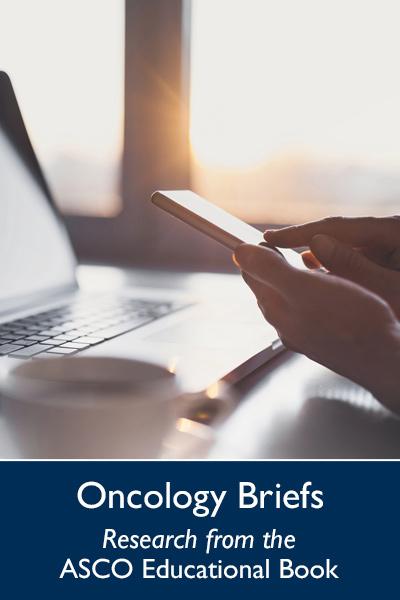
The ASCO Educational Book is a collection of articles written by ASCO Annual Meeting speakers and oncology experts. Published annually, each volume highlights the most compelling research and developments across the multidisciplinary fields of oncology such as surgery, radiation therapy, symptom management, health services research, international perspectives, and immunology, among other topics.
In collaboration with Cancer.Net, authors of the ASCO Educational Book have tailored their articles for patients and their loved ones so that they may be similarly informed of the latest science in oncology to improve their care and outcomes.
Merry Jennifer Markham, MD, is an associate professor in the division of hematology and oncology at University of Florida Health, where she also co-leads the Multidisciplinary Gynecologic Oncology Program. Danielle Gentile, PhD, is a Health Services Researcher Intermediate at the Levine Cancer Institute of the Carolinas Healthcare System. David L. Graham, MD, FASCO, is the Physician Administrator at Levine Cancer Institute of the Carolinas Healthcare System. He is also an Associate Editor for the ASCO University Editorial Board and a member of ASCO’s Cancer Communications Committee and Practice Guidelines Implementation Network.
Social media sites like Facebook and Twitter do more than allow users to keep tabs on celebrities and old classmates. Social media also allows oncology professionals to collaborate on research and insights and, in doing so, better treat people with cancer.
#SpreadingTheWord
Before the era of social media, news about new cancer treatments and clinical trial results might take a while before it reached widespread audiences. But on platforms like Twitter, real-time news instantly reaches broad audiences. In 140 characters or less, oncology professionals can send key findings from research studies or presentations to thousands of followers. These followers can then click a single button to share that information with their own followers, who can do the same. In a matter of minutes, news about groundbreaking research becomes publicly and widely available.
For example, if a doctor can’t attend the ASCO Annual Meeting, she could follow the @ASCO Twitter handle to see real-time information about new research. This information could change the way she decides to treat a patient.
People can read specific news in cancer treatment by clicking on or searching by hashtags, which are words or acronyms following “#”. Common cancer hashtags include:
-
#AYACSM: Adolescent and young adult cancer
-
#BCSM: Breast cancer
-
#CRCSM: Colorectal cancer
-
#GynCSM: Gynecologic cancer
-
#KCSM: Kidney cancer
-
#LCSM: Lung cancer
-
#LeuSM: Leukemia
-
#LymSM: Lymphoma
-
#MMSM: Multiple myeloma
-
#PallOnc: Palliative oncology
-
#PancSM: Pancreatic cancer
-
#PCSM: Prostate cancer
-
#PedCSM: Pediatric cancer
#JoiningTheConversation
Getting new information out there is the first step, but it’s equally important for physicians to then figure out how this news relates to their practice. That is, how should a piece of new research change the way physicians treat their patients? That’s where online forums and chats come into play. On Twitter, “tweet chats” give users organized settings to discuss specific topics organized around designated hashtags. Twitter users can send out questions, answers, insights, and observations about the chat’s specific topic. Tweet chats are usually held weekly or monthly and are organized by moderators. For instance, moderators affiliated with the @gyncsm account organize a monthly chat about gynecological cancers using the #GYNCSM hashtag.
#Networking
By nature, social media sites are networking goldmines. They are called “social networks” for a reason. Tweet chats and forums give professionals opportunities to share insights with colleagues across the globe, while closed Facebook groups like “Physicians Mom Group” or “Hematology and Oncology Women Physician Group” are places for in-depth, personal conversations that foster support and friendship as well as professional growth.
Because every professional connection is a resource for opinions, insights, and knowledge, the more professional connections a physician has, the more informed she will be when it comes to successfully treating patients.
#PatientEngagement
So how can patients and caregivers use social media to contribute to improved patient care? Through #engagement. People who engage with cancer-related topics on social media can gain valuable knowledge and support. This knowledge and support can also help relieve worries and lower stress. Research shows that people with cancer who engage on social media are more likely to follow their treatment plan and see the doctor regularly.
#MakingADifference
Many patients on social media don’t provide enough of their own insights to help oncology professionals improve their care. If you really want to improve care, don’t just read the content you come find in social media. Respond to it. Retweet it. Like it. React to it. Individually, these actions may seem insignificant, but together, they go a long way in improving outcomes for people with cancer.
More detailed information can be found in the ASCO Educational Book article from which this blog was based.
